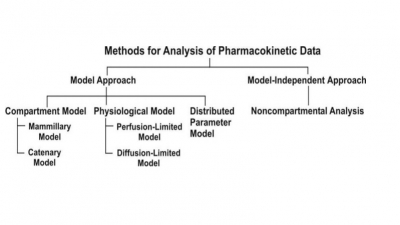One-Compartment Open Model (Instantaneous Distribution Model)
| Home | | Biopharmaceutics and Pharmacokinetics |Chapter: Biopharmaceutics and Pharmacokinetics : Compartment Modelling
The one-compartment open model is the simplest model.
ONE-COMPARTMENT OPEN MODEL
(Instantaneous Distribution Model)
The one-compartment open model is the simplest
model. Owing to its simplicity, it is based on following assumptions –
1.
The body is considered as a
single, kinetically homogeneous unit that has no barriers to the movement of
drug.
2.
Final distribution equilibrium
between the drug in plasma and other body fluids (i.e. mixing) is attained instantaneously and maintained at all times.
This model thus applies only to those
drugs that distribute rapidly throughout the body.
3.
Drugs move dynamically, in
(absorption) and out (elimination) of this compartment.
4.
Elimination is a first-order
(monoexponential) process with first-order rate constant.
5.
Rate of input (absorption) >
rate of output (elimination).
6.
The anatomical reference
compartment is plasma and concentration of drug in plasma is
representative of drug concentration in all body tissues i.e. any change in
plasma drug concentration reflects a proportional change in drug concentration
throughout the body.
However, the model does not assume that the drug
concentration in plasma is equal to that in other body tissues. The term open indicates that the input
(availability) and output (elimination)
are unidirectional and that the drug can be eliminated from the body. Fig.
9.1 shows such a one-compartment
model. One-compartment open model is generally used to describe plasma levels
following administration of a single dose of a drug.

Fig. 9.1 Representation of one-compartment open model showing input and output processes.
Depending upon the rate of input, several
one-compartment open models can be defined:
·
One-compartment open model, i.v.
bolus administration.
·
One-compartment open model,
continuous i.v. infusion.
·
One-compartment open model, e.v.
administration, zero-order absorption.
·
One-compartment open model, e.v.
administration, first-order absorption.
Related Topics

